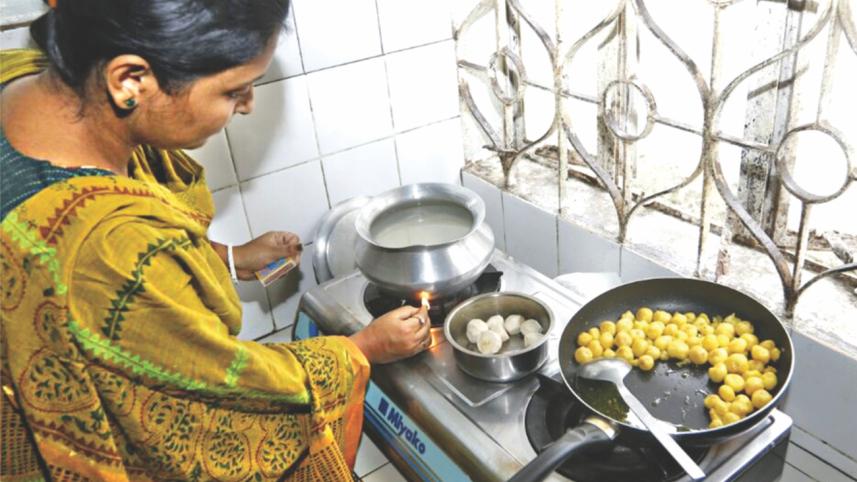Gas Crisis Hits Dhaka Dwellers!

“Coming back from the office at 8 at night, it's really intolerable to prepare the next day's breakfast and lunch, even my child's tiffin, along with dinner”, says 35-year-old Rabeya Moudud, who works at a private company, and lives in Agargaon area of Sher-e-Bangla Nagar. “Though my working hours start at 2 in the afternoon, I sometimes cannot even turn on the stove in the morning”, she adds.
On the other hand, Helena Mredha (50), a hostel owner of Basabo area is very anxious due to the ongoing gas crisis that has hit the city. “My staff members are waking up long before sunrise in this winter, to prepare the lunch and dinner for the students, while the breakfast is prepared the night before,” says Helena. Not only does she fail to provide a large number of students with food on time, but also the quality of food has been fallen greatly due to this crisis. And, it can become an alarming cause of different health complications.
Like Rabeya and Helena, dwellers from different areas in the city, for example- Agargaon, Taltola, Shewrapara, Kazipara, Senpara, Pallabi, Adabor, Nakhal Para, Tejkuni Para, Badda, Dakkhin Khan, Ashkona, Rayer Bazar, and many areas of old part of the town are facing serious trouble due to the recent gas crisis. Though the supply of gas usually falls in winter, compared to the previous years, this time the problem has slapped the city-dwellers hard to a great extent. Currently, people are suffering from severe problems which begin from 7am, and normalises at 4pm, in some cases at night.
In this moment of crisis, people have already started to depend on alternative methods, for instance— kerosene stoves, cylinders, earthen stoves, electric cookers or sometimes take-away foods to meet the daily demands. Though cylinders have eased the hassles of the upper classes, the extra cost has become an added burden to the people of middle and lower income. On the other hand, there is a fear of rise in the electricity bills, for continuously using electronic means to prepare daily food for the family.
“Since winter set in, as a very old person, my father truly needs some hot water everyday for bathing”, says 40-year-old Shah Jahan, a day labourer from Ashkona Area of the airport. “Again, as we have financial limitations for using alternative methods, such as-water heaters, my 5-year-old boy has to suffer from the same problem, which is indefinable”, he states.
Meanwhile, the Titas Gas Transmission and Distribution Company Ltd, the organisation that is responsible for supplying gas to the capital is already tired of receiving complaints from the consumers from the entire city. But, what is the actual reason behind this?
“Actually, the domestic use of gas increases 20 percent in winter, for which such problems occur”, says H M Ali Ashraf, Director (operations), at the Titas Gas Transmission and Distribution Company Ltd.
Besides, according to the Titas source, the supply-demand issue is another quite important factor for such crises. Currently, the total demand of Titas gas is 2050 million cubic feet per day (mmcfd), while they are being able to supply only 1750 mmcfd. So, a shortage of 300 mmcfd is already here, which is a very crucial reason for the ongoing crisis. But there is a hope that, within the beginning of the next year, there is a possibility of an increase in the total production, which may solve this problem to an extent.
On the other hand, the government's long term plan to deal with this problem is implementing Liquefied Natural Gas (LNG) project, which is supposed to start in the beginning of the 2018.
In the meantime, experts believe that implementing the expensive LNG project is not the fruitful solution at all for such crises. Rather, the illegal connections should be identified immediately and with pressure, so that the legal consumers need not face such difficulties in the winter.
Although, the recent gas crisis has become the talks of the town today, city people claim that no significant initiatives are taken yet to solve their problems. As always, they are still expecting the government to understand their plight, and eventually, do something feasible, as soon as possible.




 For all latest news, follow The Daily Star's Google News channel.
For all latest news, follow The Daily Star's Google News channel.
Comments